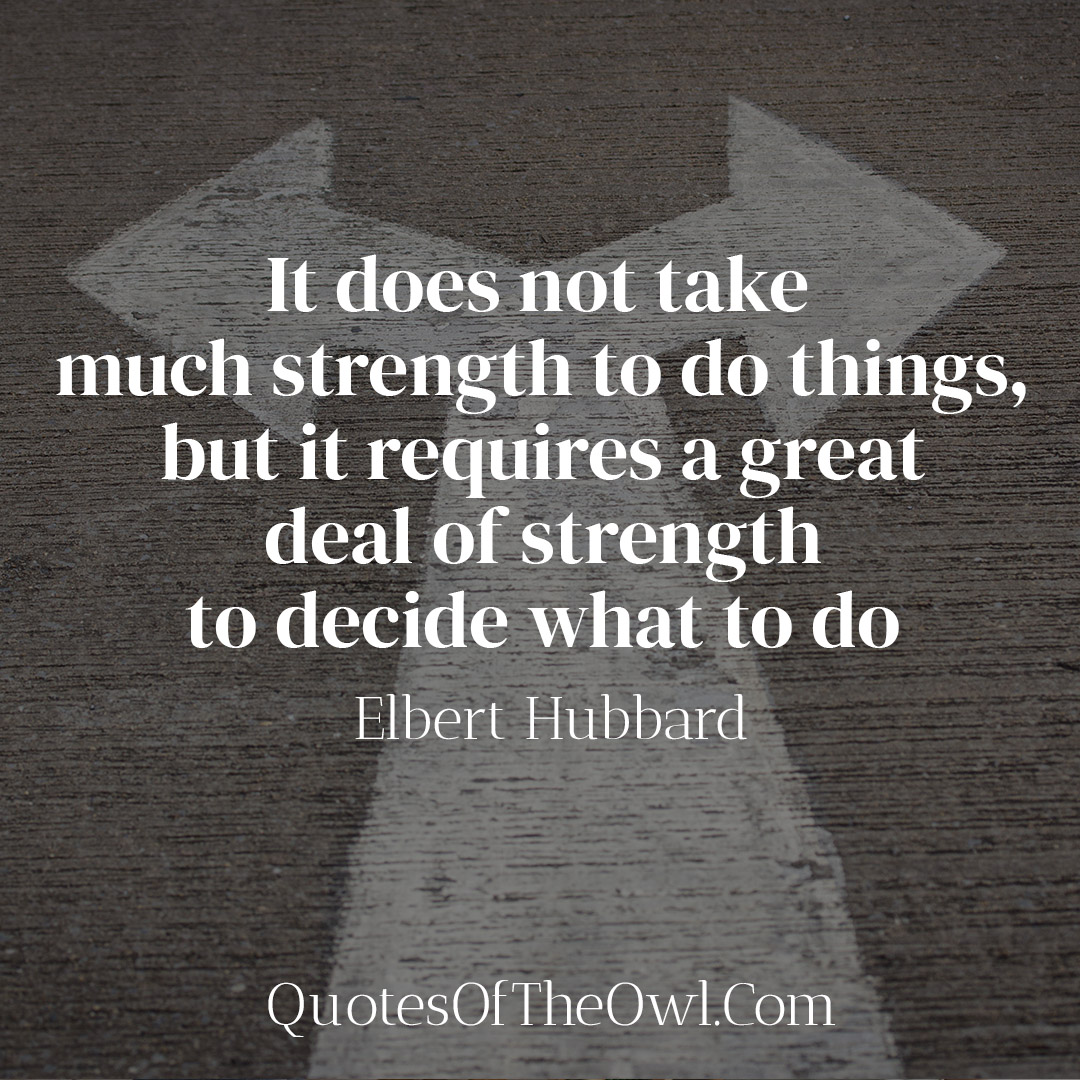It does not take much strength to do things, but it requires a great deal of strength to decide what to do. – Elbert Hubbard’s Quote Meaning
Making decisions is an integral part of our lives. From small everyday choices to life-altering decisions, our ability to decide shapes our paths and determines our outcomes. Elbert Hubbard’s quote, “It does not take much strength to do things, but it requires a great deal of strength to decide what to do,” offers valuable insight into the significance of decision-making. In this article, we will delve into the meaning of this quote, explore the importance of decision-making, discuss the factors that influence our decisions, and provide strategies for building decision-making strength.
Understanding Elbert Hubbard’s Quote
Interpretation of “It does not take much strength to do things”
When Hubbard states that it does not take much strength to do things, he refers to the execution of tasks or actions. Performing tasks, whether simple or complex, often relies on physical or mental effort, skills, or knowledge. It implies that the act of doing something is relatively straightforward and may not require exceptional qualities or profound deliberation.
Interpretation of “It requires a great deal of strength to decide what to do”
On the other hand, Hubbard emphasizes the inherent difficulty in decision-making. Deciding what to do necessitates a higher level of strength, which encompasses emotional resilience, intellectual acuity, and moral courage. It implies that the process of choosing from various options, considering consequences, and taking responsibility for the outcome demands more profound deliberation and determination.
Importance of Decision-Making
Decisions as Reflections of Character
Our decisions reflect who we are as individuals. They reveal our values, priorities, and the principles we uphold. Each decision we make shapes our character, contributing to the narrative of our lives. Making thoughtful and considered choices empowers us to align our actions with our core beliefs, fostering personal growth and integrity.
Impact of Decisions on Life
Decisions have a profound impact on our lives. Whether it is deciding on a career path, choosing a life partner, or making financial investments, our choices determine the direction and quality of our existence. Well-considered decisions lead to opportunities, personal fulfillment, and success, while hasty or uninformed choices can result in regrets, missed chances, and adverse consequences.
Factors Influencing Decision-Making
Various factors influence our decision-making process, affecting the quality and outcomes of our choices.
Personal Values and Beliefs
Our personal values and beliefs serve as guiding principles in decision-making. They shape our perspectives, define our priorities, and influence the options we consider. Understanding our values and aligning them with our decisions helps us make choices that are consistent with our authentic selves.
External Influences
External influences, such as societal norms, cultural expectations, and peer pressure, can significantly impact our decision-making. The fear of judgment or the desire for social acceptance might sway our choices, leading to decisions that may not align with our true desires or beliefs. Recognizing these influences and critically evaluating their impact allows us to make more independent and authentic decisions.
Building Decision-Making Strength
Enhancing our decision-making strength requires cultivating specific skills and adopting effective strategies.
Self-Awareness and Clarity
Developing self-awareness and clarity about our goals, values, and aspirations provides a solid foundation for decision-making. Understanding ourselves enables us to make choices that are in harmony with our authentic selves, leading to greater satisfaction and fulfillment.
Gathering Information
Making informed decisions necessitates gathering relevant information. Researching, seeking advice from trusted sources, and considering various perspectives expands our knowledge base, enabling us to evaluate options more comprehensively.
Analyzing Pros and Cons
Weighing the pros and cons of each option allows for a more objective evaluation of potential outcomes. Assessing the advantages and disadvantages helps in identifying potential risks and rewards associated with different choices, assisting us in making more informed and balanced decisions.
Overcoming Decision-Making Challenges
Decision-making can be accompanied by challenges that hinder our ability to choose effectively.
Fear of Making Wrong Choices
The fear of making wrong decisions can paralyze us and prevent us from taking action. It is essential to understand that mistakes are part of the learning process and that even if a decision doesn’t yield the desired outcome, it provides valuable lessons and opportunities for growth.
Overthinking and Analysis Paralysis
Overthinking and analysis paralysis can impede decision-making. Constantly second-guessing ourselves and endlessly pondering the possibilities can lead to indecision and missed opportunities. Setting reasonable time frames for decision-making and trusting our instincts can help overcome this challenge.
Developing Resilience and Confidence
Building decision-making strength also involves developing resilience and confidence in our choices.
Learning from Mistakes
Embracing mistakes as opportunities for growth and learning allows us to develop resilience. Acknowledging and reflecting on the consequences of past decisions helps us refine our decision-making processes and make more effective choices in the future.
Trusting Intuition
Intuition can play a valuable role in decision-making. Cultivating self-trust and listening to our inner voice allows us to tap into our intuition and make decisions that align with our deeper wisdom and instincts.
Conclusion
Elbert Hubbard’s quote reminds us that true strength lies not in the execution of tasks but in the decision-making process. Making thoughtful and considered choices requires resilience, self-awareness, and the ability to navigate the complexities of life. By understanding the factors that influence decision-making and implementing strategies to enhance our decision-making strength, we empower ourselves to shape our lives with intention and purpose.
Discover more Elbert Hubbard Quotes!
Discover the timeless wisdom of Elbert Hubbard through his captivating books

